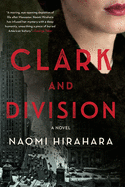
The incarceration of 120,000 Americans of Japanese ancestry during World War II is undoubtedly one of the most egregious episodes in 20th-century U.S. history. Third-generation Japanese American Naomi Hirahara carves a little-known sliver from that grievous experience and layers it with mystery to create her provocative novel Clark and Division.
The War Relocation Authority eventually began releasing young adults to relocate in small numbers in such cities as Chicago, Denver and New York--because they were forbidden to return to their West Coast homes. In September 1943, Rose Ito was the first in her family to be discharged from Manzanar to resettle in Chicago. Her parents and younger sister, Aki, apply to follow her in the spring, but tragically, Rose is killed on the tracks of Chicago's Clark and Division subway station the night before the family's reunion. Her death is ruled a suicide, but "Rose wouldn't do that," Aki insists. She's convinced she knew her beloved, feisty, determined sister best, but is shocked when the coroner reports that Rose had had a recent abortion. Aki's doubts and questions immediately multiply. What she uncovers couldn't be more timely--anti-Asian racism and violence, illegal medicine, mob control, dirty cops.
Although she's skillfully integrated historical events in many of her previous titles, Hirahara's 10th novel incorporates three decades of researching and collecting the oral histories of Americans imprisoned for being of Japanese heritage. While Clark and Division is currently a standalone endeavor, Aki Ito shows plenty of intriguing tenacity to star in a series of her own. Readers are sure to agree. --Terry Hong, Smithsonian BookDragon

